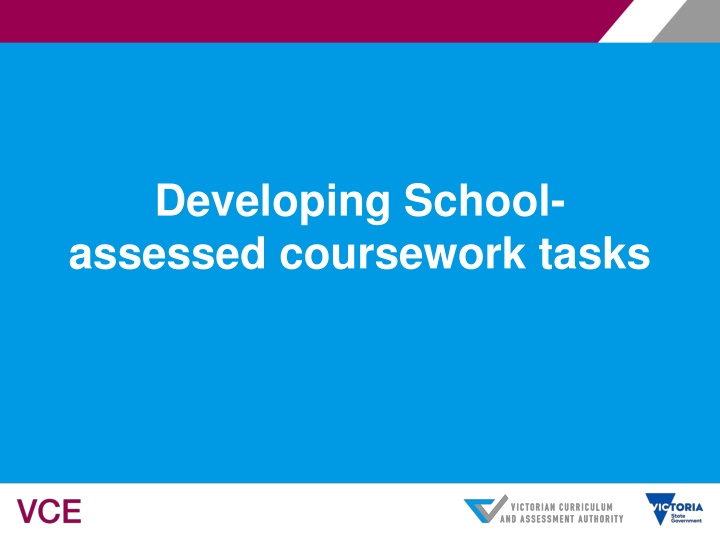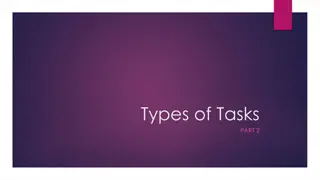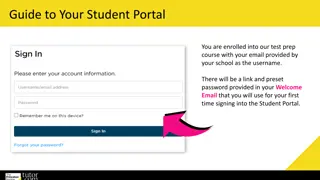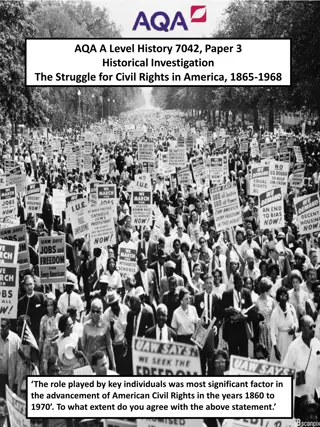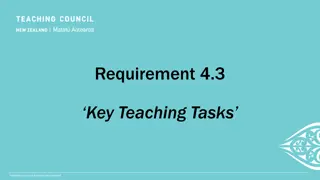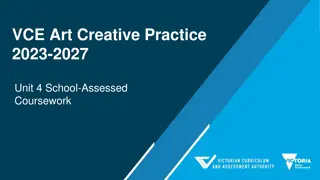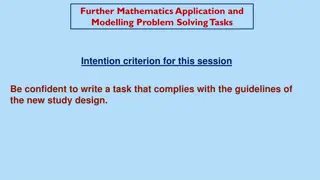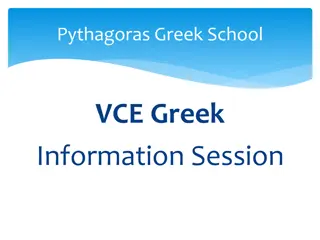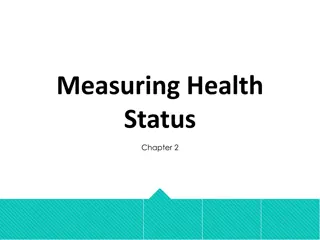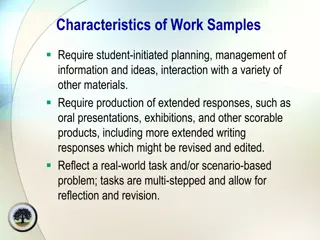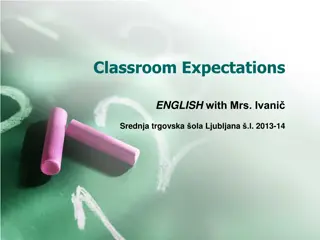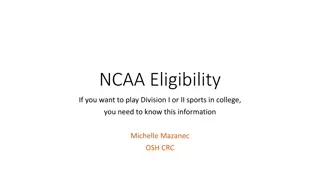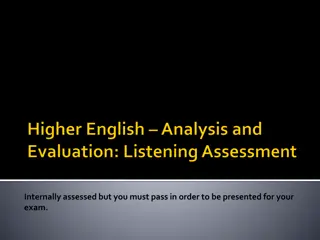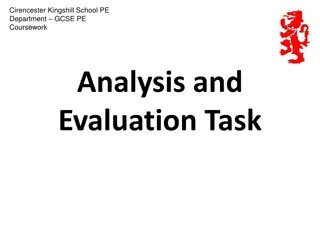Developing School-assessed coursework tasks
Explore the importance of assessment in senior secondary education, focusing on VCE assessment principles, task design considerations, and key criteria for valid, equitable, and balanced assessments.
Download Presentation

Please find below an Image/Link to download the presentation.
The content on the website is provided AS IS for your information and personal use only. It may not be sold, licensed, or shared on other websites without obtaining consent from the author.If you encounter any issues during the download, it is possible that the publisher has removed the file from their server.
You are allowed to download the files provided on this website for personal or commercial use, subject to the condition that they are used lawfully. All files are the property of their respective owners.
The content on the website is provided AS IS for your information and personal use only. It may not be sold, licensed, or shared on other websites without obtaining consent from the author.
E N D
Presentation Transcript
Developing School- assessed coursework tasks
VCE assessment principles Assessment is an integral part of teaching and learning that at the senior secondary level: identifies opportunities for further learning describes student achievement articulates and maintains standards provides the basis for the award of a certificate.
VCE assessment principles As part of VCE studies, assessment tasks enable: the demonstration of the achievement of an outcome or set of outcomes judgment and reporting of a level of achievement for school-based assessments at Units 3 and 4.
VCE Assessment principles VCE assessment will be valid (fair and reasonable) equitable balanced and efficient.
1. Valid assessment Does the assessment enable judgments to be made about demonstration of outcomes and levels of achievement fairly, in a balanced way without adverse effects on or for the education system? ASK, is the task fair and reasonable? specified in the study design as one of the designated task types? conducted under fair conditions? conducted under substantially the same conditions for all students in the cohort PLUS are there clear instructions included?
2. Equitable Do the assessment instruments ensure that no students are either privileged or disadvantaged, nor are any students excluded based on gender, culture, linguistic background, physical disability, socioeconomic status or geographical location. Is the task conducted under same/similar conditions to provide consistent information about student performance? ASK, is the task accessible to all students? privileging a certain type of student? comparable in scope and demand if a choice of task is offered within?
3. Balanced Tasks should be designed to provide a range of opportunities for students to demonstrate in different contexts and modes and demonstrate different levels of achievement. ASK Are a variety of task types used? Are a variety of conditions used? Do the tasks allow students to demonstrate different levels of achievement? Are suitable criteria, descriptors, rubrics or marking schemes used? How broadly are the key knowledge, key skills and outcomes being covered / assessed?
4. Efficient The minimum number of assessments must be set to enable a robust judgment about the progress and learning of each student. This number of assessments is set in the VCE study design. Each assessment instrument must balance the demands of precision with those of efficiency. Assessment should not generate workload and/or stress that unduly diminishes the performance of a student under fair and reasonable conditions. ASK: Have minimum number of assessments been set? Does the assessment generate undue student stress? Are students being under assessed or over assessed on the outcome?
School-based assessment In Units 3 and 4, specified tasks and task types are set out in the study design Teachers and schools are encouraged to develop their own assessment tasks based on the VCE assessment principles
Individual VCE subject teachers select from designated assessment task types specified in study design develop and administer a school-based assessment program considering the needs of the student cohort monitor student work and progress within the cohort provide feedback about School-based assessment to individual students to assist in determination of Satisfactory / Non satisfactory completion of outcome determine individual student achievement levels for School Based Assessment
School-based assessment Students must be pre informed about: Assessment timelines Conditions the assessment will be conducted under Resources permitted within the assessment Include conditions and resources permitted on task coversheet. School policies and procedures, including conditions and rules under which School-based assessment will take place, must be communicated to students and parents at the beginning of academic year, or when student enrols in VCE.
Coversheet inclusions What students are expected to do /complete Criteria students are to be assessed against Does the task clearly indicate: Conditions (open / closed book etc.) Time and length of task Breakdown of mark allocation
School-based assessment School assessed task (SAT) School assessed coursework (SAC) which are set by the VCAA to assess specific sets of practical skills and knowledge. teachers assess the student s level of achievement on the basis of a rating against criteria specified by the VCAA. schools provide a score for each criterion. which consists of a set of assessment tasks that assesses each student s level of achievement in Units 3 and 4 outcomes as specified in the study design. schools provide a score for each component of coursework specified in the study design. The VCAA aggregates these scores into a single total score for each student, which is then statistically moderated against the examination scores in the study. (VCE & VCAL handbook 2019, p. 73)
Developing a school-based assessment task For Units 1 4 in all VCE studies assessment tasks must be a part of the regular teaching and learning program and must not unduly add to the workload associated with that program. School-based assessment tasks must be completed mainly in class and within a limited timeframe.
School-based assessment must: Allow Be completed mainly in class within the nominated timeframe Be consistent for all students of the subject within the school authentication Elicit a spread of results issues to be addressed
Developing a school-based assessment task Ensure the task does assess the Outcome and does not under OR over assess key knowledge and key skills. Check that the task developed is not excessive in scope does not restrict opportunity to demonstrate key skills and key knowledge has balanced coverage and depth
who Consider the cohort of students what Consider the Outcome being assessed when Consider the timing of the task where Consider the conditions of assessment why Consider the purpose of the task how Consider the task type
Developing a school-based assessment task Minimise reading time Place stimulus material and other written information close to the item Make sure that a stimulus, if included, must actually be used to answer the questions Place easier items earlier in the task where possible Include a range of questions (use a taxonomy, SOLO, Blooms etc. to ensure a spread of questions) Make sure the typical student can finish the SAC in the time available Low 25% High 25% Middle 50%
Developing a school-based assessment task Ensure Appropriate depth in assessment of key knowledge, key skills, outcome statements and unit introduction. Questions provide opportunity for achievement of highest level of performance Assessment is appropriate and understandable for the student cohort Wording /language is clear and appropriate for VCE students. Reflect terminology in study design
Commercially produced tasks May be used but MUST be adapted. School-assessed coursework tasks need to be UNIQUE to each individual school Always check that the task type is appropriate and that the key knowledge, key skills and outcome are being assessed accordingly. It is the responsibility of the school and teacher to: check that a commercially produced task is compliant with VCAA requirements. ensure authentication of student work.
School-assessed Coursework Task Unit 3 Page 24, VCE Media Study Design
Advice for teachers includes: Assessment information about Unit 3 & 4 SACs Advice about construction and incorporation of SAC tasks Advice about grading: performance descriptors https://www.vcaa.vic.edu.au/Pages/vce/adviceforteachers/ media/introduction.aspx
Example Unit 3 Outcome One SAC Unit 3 Outcome 1 On completion of this unit the student should be able to analyse how narratives are constructed and distributed and how they engage, are consumed and are read by the intended audience and present day audiences. https://www.vcaa.vic.edu.au/Pages/vce/adviceforteachers/media/unit3- areastudy1.aspx
Requirements for Outcome One One of the following dot points: At least two feature length film products of one hour or more in length or the equivalent length in television, streamed, radio or audio products. Two photographic series of at least six images each. Two print productions of at least 15 pages each. NB: At least one media product must have been released in the five years prior to the commencement of the year of study (5 years prior to 2019)
Example Unit 3 Outcome 1 Key Knowledge Key Skills 1. The characteristics and construction of media narratives in selected media forms. How audiences from different periods of time engage with, consume and read media narratives. The relationship between and the function of media codes and conventions to convey meaning in selected media forms. The relationship between media narratives and the ideological and institutional contexts in which they are produced, distributed, consumed and read. The way ideologies shape media narratives. The relationship between media narratives and audiences Appropriate media language 1. Explain the characteristics and construction of media narratives in selected media forms. Discuss how media narratives are constructed, consumed and read by audiences from different periods of time. Analyse the relationship between the function of media codes and conventions to convey meaning in selected media forms. Analyse the relationship between media narratives and the ideological and institutional contexts of production distribution, consumption and reception. Discuss how ideologies shape media narratives. Discuss the relationship between media narratives and audiences. Discuss audience engagement with, consumption and reading of media narratives. 2. 2. 3. 3. 4. 4. 5. 6. 5. 6. 7. 7.
Content vs. descriptors Item mapping KK KS 1 Explanation of the characteristics and construction of media narratives. 1, 2,7 1, 2,8 2 Analysis of the relationship between and the function of media codes and conventions to convey meaning. 3, 7 3, 8 3 Discussion on the relationship between media narratives and audiences, with an analysis of how audiences read, consume and are engaged by different media narratives from different periods of time. 2, 4, 6, 7 2, 4,6,7, 8 4 Discussion of how ideologies shape media narratives. 5,7 5,8 5 analysis of the relationship between media narratives and the ideological and institutional contexts of production, distribution, consumption and reception. 4, 2, 7 4,2, 8
Cross study specifications Media forms Media products Media technologies Media narratives Media codes Media conventions Media production process Media language
Ideology Ideology is a system of ideas and beliefs that form the basis of a society s values, economic or political theory and policy and therefore the actions of those who believe in that ideology. Chief Assessors Report, 2019
Task In five small groups, using the study design on your table, work through the process (see flowchart) of developing an assessment task. Report back from the discussion and interactions within your groups on: Stimulus material Task types Resources
Gather: Using study design identify relevant: Study design Process: developing a school based assessment task VCAA Principles of Assessment Unit Administrative information (SAT) Area of study Advice to Teachers Outcome to be assessed School policy manual Identify: Gather resources to complete design of task : stimulus material Outcome Select task type Key knowledge Refer to from list in study design Key skills Principles of assessment Advice to Teachers Specify content to be assessed Reflect/ evaluate Design task: 25% Lower order Trial with colleagues Check against Key skills, Key knowledge and Outcome 50% medium order Refine Deliver 25% higher order Evaluate
Checklist Inform students re basis of assessment. (conditions task type, outcome to be assessed) Ensure marks are clearly allocated and identified Ensure totals add up Ensure mark allocation corresponds to question difficulty Ensure task reflects and assesses key knowledge and key skills Check spelling, expression, syntax. Would it make sense to a VCE student?
